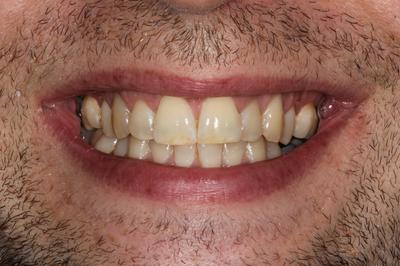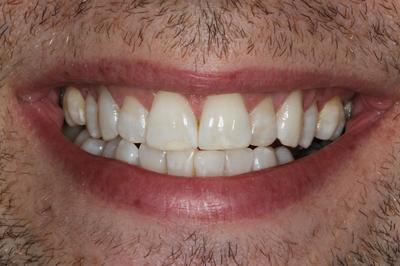Crowns and bridges
Restore your smile using the remaining healthy structure of your teeth and fix damage, decay and gaps in your teeth with custom-made crowns and bridges at Carisbrook Dental.

Dental bridges at a glance
Dental bridges are customised fixed false teeth which bridge a gap created by one or more missing teeth. Whether you’re looking for the traditional fixed bridge, cantilever bridge or resin-bonded bridges, at our Manchester practice we can help.
The three types of dental bridge
Traditional fixed bridge
This is the most common dental bridge. It involves creating a crown for the tooth on either side of the missing tooth, with a replacement tooth in between, which is made from porcelain fused to metal or ceramics.
Cantilever bridge
This is used when there are adjacent teeth on only one side of the missing teeth.
Resin bonded bridge
Also known as a Maryland bonded bridge, this is made of plastic teeth/porcelain attached to a thin metal framework. Metal wings on both sides of the bridge are bonded to your existing teeth on the inside of your teeth. This type of bridge is very conservative on your teeth as little preparation of the teeth is needed. Resin bonded bridges are generally recommended for low impact areas as they are not as strong as conventional bridges.


Dental crowns at a glance
Crowns are an effective way of restoring your smile and protecting weakened teeth.
A dental crown is an artificial restoration that fits snugly over the whole tooth once it has been prepared. Each crown is custom made for your tooth and is prepared and fitted over two appointments.
Crowns are designed to:
- Strengthen a weak tooth or weak teeth
- Restore a tooth after root canal treatment
- Improve the appearance of discoloured or damaged teeth
- Support dentures
Types of dental crown
There are different types of crowns available, each with its own advantages and disadvantages which your dentist at Carisbrook Dental will discuss with you.
The four types of dental crowns are:
- Gold alloy
- Ceramic
- Porcelain
- Porcelain bonded to precious metal


The dental crown treatment process
First appointment
- Topical and local anaesthetic is placed to numb the area to make the procedure as comfortable as possible.
- The first impression is taken to create a temporary crown later in the appointment.
- The tooth is shaped and prepared for a crown.
- A second impression is then taken of the prepared tooth, a record of your bite and your desired tooth shade – we send these records to the laboratory to make the crown.
- A temporary crown is made chair-side using the impression we took earlier in the appointment and fitted comfortably in your bite.
Second appointment
- The second appointment involves fitting the crown and making any necessary adjustments until both yourself and the dentist are happy.
Frequently asked questions about dental crowns and bridges
Rather than looking artificial, your crown will be made to match the colour and shape of your surrounding teeth. We use a variety of different laboratories which each specialises in the manufacture of the crowns. Each crown is custom-made for each patient, designed to look great and fit perfectly.
Your dentist will start by numbing the area to be fitted with a dental crown or bridge with a local anaesthetic to keep you comfortable throughout the treatment. Some patients may experience mild discomfort or sensitivity after the procedure, but this can usually be managed with over-the-counter pain medication and should ease quite quickly.
Keeping on top of good oral hygiene practices such as brushing your teeth twice a day, flossing daily, and regular dental check-ups can help prolong the lifespan of dental crowns and bridges. We also suggest avoiding chewing hard objects or foods, to minimise the risk of damaging the restoration.
Ready to get started?
Book a free consultation at our Manchester practice and begin your journey to a straight smile.


6 Knowsley Rd, Whitefield,
Manchester. M45 6BF
Tuesday: 8:30am – 6pm
Wednesday: 8:30am – 6pm
Thursday: 9am – 5pm
Friday: 8am – 3pm
Saturday: 9am – 1pm (open on select Saturdays per month, please contact us for further information)
Sunday: Closed










